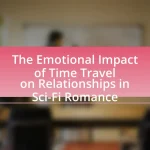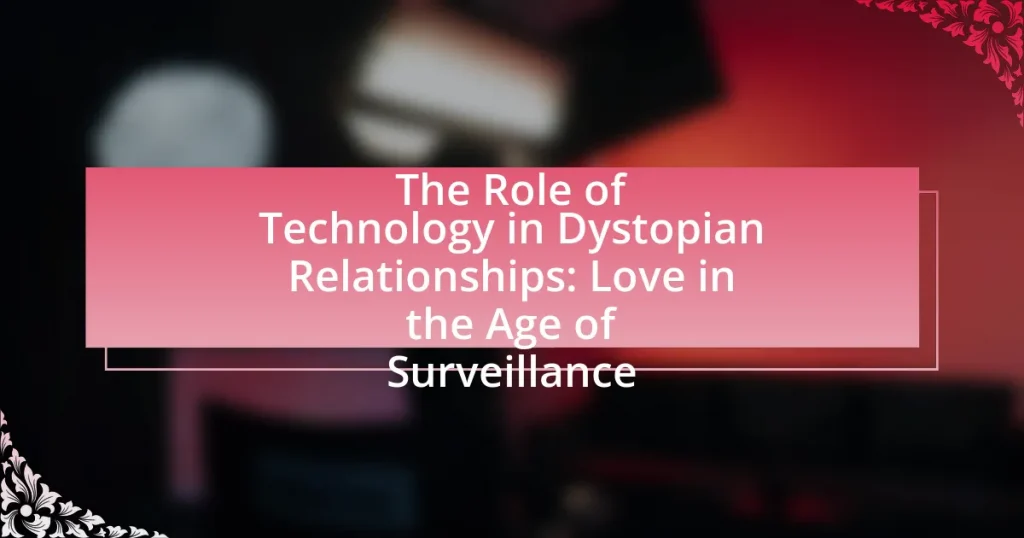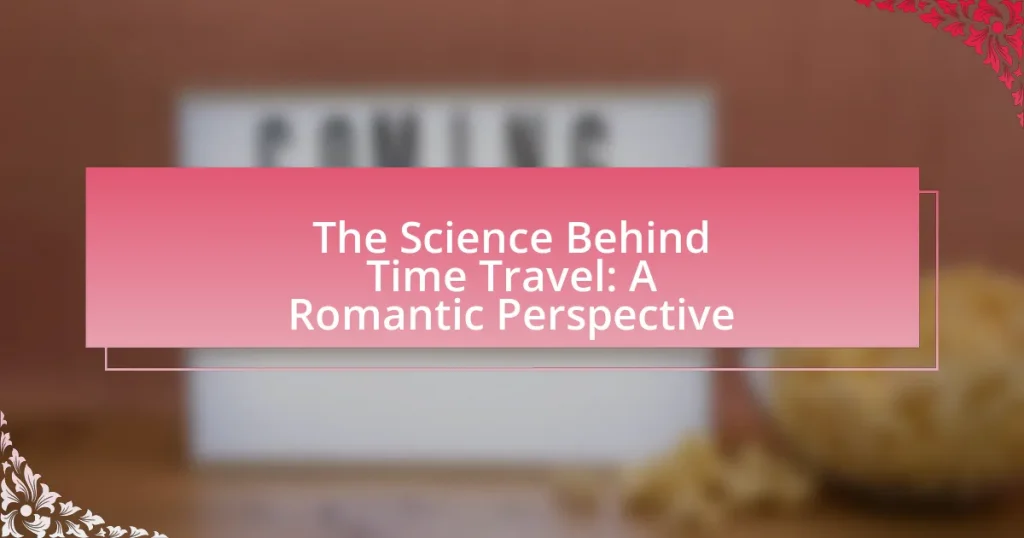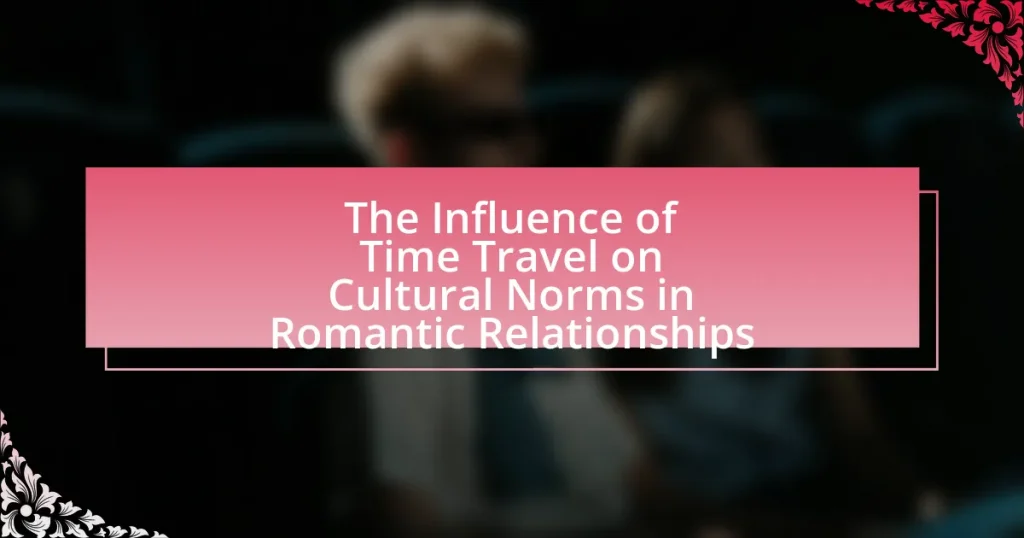The article examines the role of technology in dystopian relationships, focusing on how it facilitates surveillance, manipulation, and control, ultimately undermining trust and intimacy. It discusses the impact of surveillance systems, communication platforms, and data analytics on interpersonal dynamics, highlighting how these elements create barriers to genuine emotional connections. The article also explores the psychological effects of technology on love, the implications of digital dependency, and the influence of social media on perceptions of relationships, emphasizing the complexities of love in a technology-driven world. Through notable examples from literature and film, it critiques contemporary societal issues related to technology and offers strategies for maintaining intimacy in a surveillance-heavy environment.
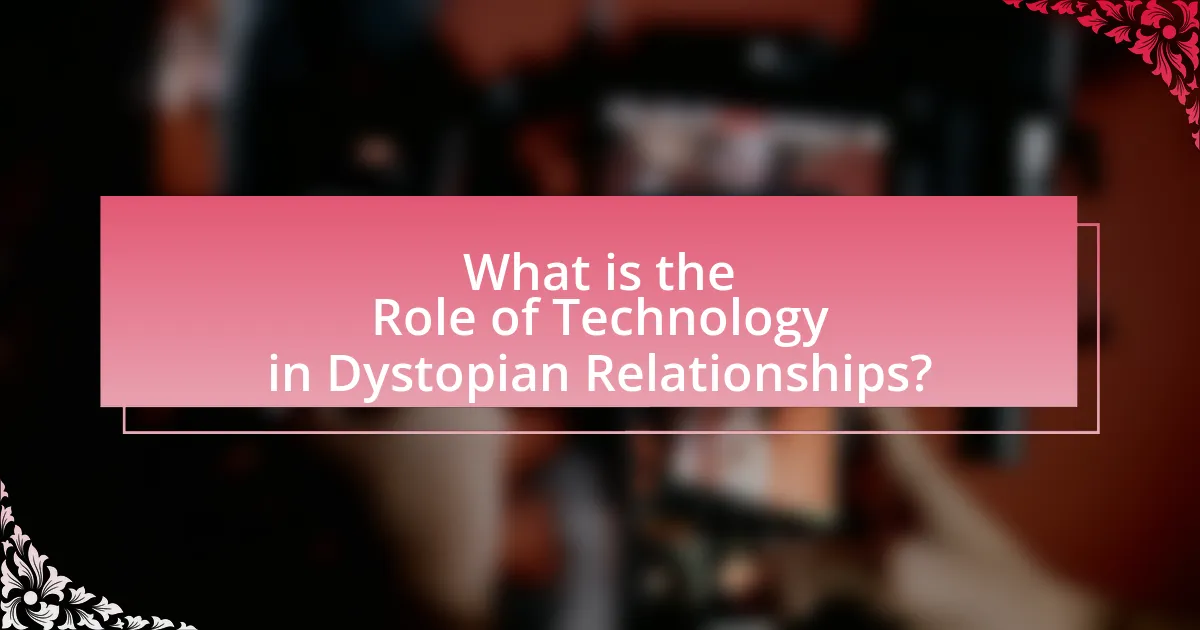
What is the Role of Technology in Dystopian Relationships?
Technology plays a pivotal role in dystopian relationships by facilitating surveillance, manipulation, and control over individuals. In such settings, technology often serves as a tool for oppressive regimes to monitor personal interactions and enforce conformity, leading to a breakdown of trust and intimacy. For instance, in George Orwell’s “1984,” the omnipresent telescreens exemplify how technology invades personal spaces, creating an environment where genuine relationships are stifled by fear of constant observation. This dynamic illustrates that technology not only alters communication methods but also fundamentally reshapes the nature of human connections in dystopian societies.
How does technology influence love and relationships in dystopian settings?
Technology profoundly influences love and relationships in dystopian settings by facilitating surveillance and control, which alters interpersonal dynamics. In these environments, relationships often become transactional and manipulated by external forces, such as governments or corporations, that monitor and dictate personal interactions. For instance, in George Orwell’s “1984,” the omnipresent surveillance by the Party stifles genuine emotional connections, as individuals fear expressing true feelings due to potential repercussions. This manipulation of relationships can lead to a lack of trust and authenticity, as partners may engage in relationships out of necessity rather than genuine affection. Furthermore, technology can create barriers to intimacy, as seen in Aldous Huxley’s “Brave New World,” where artificial reproduction and conditioning replace traditional romantic bonds, emphasizing societal stability over personal connection. Thus, technology in dystopian narratives serves as a tool for oppression, reshaping love and relationships into mechanisms of control rather than expressions of human connection.
What are the key technological elements that shape these relationships?
Key technological elements that shape relationships in the context of dystopian environments include surveillance systems, communication platforms, and data analytics. Surveillance systems, such as facial recognition and location tracking, enable constant monitoring of individuals, influencing trust and privacy in relationships. Communication platforms, including social media and messaging apps, facilitate interaction but can also lead to miscommunication and emotional distance due to their impersonal nature. Data analytics, which processes personal information to predict behaviors and preferences, can manipulate relationship dynamics by creating targeted experiences that may not reflect genuine connections. These elements collectively impact how individuals relate to one another, often fostering a sense of control and anxiety rather than intimacy.
How do these technologies alter communication and intimacy?
Technologies alter communication and intimacy by enabling instant connectivity while simultaneously fostering superficial interactions. The prevalence of social media platforms and messaging apps allows individuals to communicate across vast distances in real-time, enhancing accessibility and frequency of contact. However, studies indicate that this constant connectivity can lead to a decline in face-to-face interactions and emotional depth in relationships. For instance, research published in the journal “Computers in Human Behavior” shows that increased reliance on digital communication correlates with feelings of loneliness and decreased relationship satisfaction. Thus, while technology facilitates communication, it often undermines the quality of intimacy by replacing meaningful interactions with transient exchanges.
Why is surveillance a critical aspect of dystopian relationships?
Surveillance is a critical aspect of dystopian relationships because it serves as a mechanism for control and manipulation. In dystopian societies, the constant monitoring of individuals fosters an environment of fear and distrust, undermining genuine emotional connections. For instance, in George Orwell’s “1984,” the omnipresent surveillance by the Party not only restricts personal freedoms but also distorts relationships, as individuals are unable to express true feelings without the fear of repercussions. This pervasive oversight leads to a breakdown of intimacy, as partners may feel compelled to hide their thoughts and emotions, ultimately eroding the foundation of love and trust essential for healthy relationships.
What forms of surveillance are prevalent in dystopian societies?
Prevalent forms of surveillance in dystopian societies include mass surveillance, social media monitoring, and biometric tracking. Mass surveillance is often implemented through extensive camera networks and data collection systems, allowing governments to monitor citizens’ movements and behaviors continuously. Social media monitoring involves analyzing online interactions and communications to identify dissent or nonconformity, as seen in regimes that restrict freedom of expression. Biometric tracking utilizes technologies such as facial recognition and fingerprint scanning to identify individuals and track their activities, enhancing state control over personal privacy. These methods are designed to instill fear and compliance among the populace, as evidenced by historical examples like the surveillance practices in East Germany and contemporary implementations in countries like China.
How does surveillance impact trust and privacy in relationships?
Surveillance significantly undermines trust and privacy in relationships by creating an environment of suspicion and control. When one partner engages in surveillance, such as monitoring communications or tracking locations, it often leads to feelings of betrayal and anxiety in the other partner, eroding the foundational trust necessary for a healthy relationship. Research indicates that individuals who experience surveillance report lower relationship satisfaction and increased conflict, as evidenced by a study published in the Journal of Social and Personal Relationships, which found that 60% of participants felt their privacy was violated when subjected to surveillance by their partners. This violation of privacy not only damages emotional intimacy but also fosters a cycle of distrust, where the surveilled partner may feel compelled to hide information or retaliate, further destabilizing the relationship.
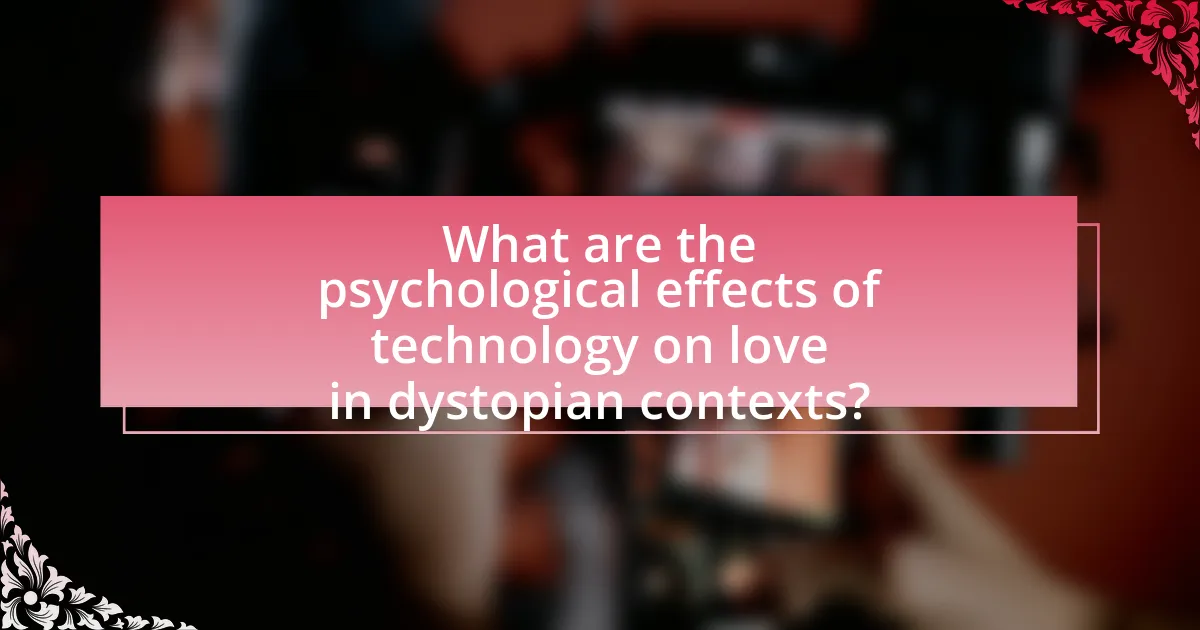
What are the psychological effects of technology on love in dystopian contexts?
The psychological effects of technology on love in dystopian contexts include increased anxiety, diminished intimacy, and a pervasive sense of surveillance. In environments where technology monitors personal interactions, individuals often experience heightened stress due to the fear of being watched, which can lead to emotional withdrawal and reduced openness in relationships. Studies, such as those conducted by Sherry Turkle in “Alone Together,” reveal that reliance on technology for communication can create barriers to genuine emotional connection, resulting in feelings of isolation even when individuals are physically close. Furthermore, the constant availability of digital communication can lead to misunderstandings and conflicts, exacerbating feelings of insecurity and jealousy among partners.
How does constant connectivity affect emotional bonds?
Constant connectivity can weaken emotional bonds by fostering superficial interactions and reducing face-to-face communication. Research indicates that individuals who rely heavily on digital communication often experience diminished emotional intimacy, as non-verbal cues and deeper connections are lost in text-based exchanges. A study published in the journal “Computers in Human Behavior” by Primack et al. (2017) found that higher social media usage correlates with increased feelings of loneliness and social isolation, suggesting that constant connectivity may paradoxically lead to emotional detachment rather than closeness.
What are the implications of digital dependency on romantic relationships?
Digital dependency significantly impacts romantic relationships by fostering communication but also introducing challenges such as miscommunication and emotional detachment. The reliance on digital platforms for interaction can lead to misunderstandings, as tone and context may be lost in text-based communication. Furthermore, studies indicate that excessive screen time can diminish face-to-face interactions, which are crucial for emotional bonding. For instance, research published in the Journal of Social and Personal Relationships found that couples who spend more time on their devices report lower relationship satisfaction. This dependency can also lead to issues of trust and jealousy, as partners may feel compelled to monitor each other’s online activities, creating an environment of surveillance rather than intimacy.
How do individuals cope with emotional isolation despite technological advancements?
Individuals cope with emotional isolation despite technological advancements by seeking meaningful connections through alternative channels, such as support groups, online communities, and therapy. These methods provide emotional support and foster a sense of belonging, counteracting feelings of loneliness. Research indicates that participation in online support groups can significantly reduce feelings of isolation, as individuals share experiences and receive validation from others facing similar challenges. For instance, a study published in the Journal of Medical Internet Research found that online communities can enhance social support and improve mental health outcomes for individuals experiencing emotional distress.
What role does social media play in shaping perceptions of love?
Social media significantly shapes perceptions of love by creating idealized representations of relationships that often influence users’ expectations and behaviors. Platforms like Instagram and Facebook allow individuals to curate their romantic experiences, showcasing highlights while omitting challenges, which can lead to unrealistic standards of love. Research indicates that exposure to these curated images can result in feelings of inadequacy and dissatisfaction in one’s own relationships, as users compare their realities to the perceived perfection of others. A study published in the journal “Cyberpsychology, Behavior, and Social Networking” found that individuals who frequently engage with romantic content on social media are more likely to experience relationship anxiety and lower satisfaction levels. Thus, social media plays a crucial role in shaping how love is perceived, often distorting reality and influencing emotional well-being.
How does social media create unrealistic expectations in relationships?
Social media creates unrealistic expectations in relationships by presenting curated and idealized versions of people’s lives, which often do not reflect reality. Users frequently share only positive experiences, leading others to compare their own relationships to these filtered portrayals. Research from the American Psychological Association indicates that exposure to idealized images on social media can lead to feelings of inadequacy and dissatisfaction in one’s own relationship, as individuals may feel pressured to meet these unattainable standards. This constant comparison fosters a distorted perception of what a successful relationship should look like, contributing to unrealistic expectations.
What are the consequences of online personas on real-life interactions?
Online personas significantly impact real-life interactions by shaping perceptions and behaviors in social contexts. Individuals often curate their online identities to project idealized versions of themselves, which can lead to discrepancies between their online and offline personas. This dissonance may result in misunderstandings, trust issues, and challenges in forming genuine connections. Research indicates that people may experience anxiety or insecurity when their real-life interactions do not align with their online representations, as highlighted in studies examining social media’s effects on self-esteem and interpersonal relationships. For instance, a study published in the journal “Computers in Human Behavior” found that individuals who engage in extensive self-presentation online often struggle with authenticity in face-to-face interactions, leading to a decline in relationship satisfaction.
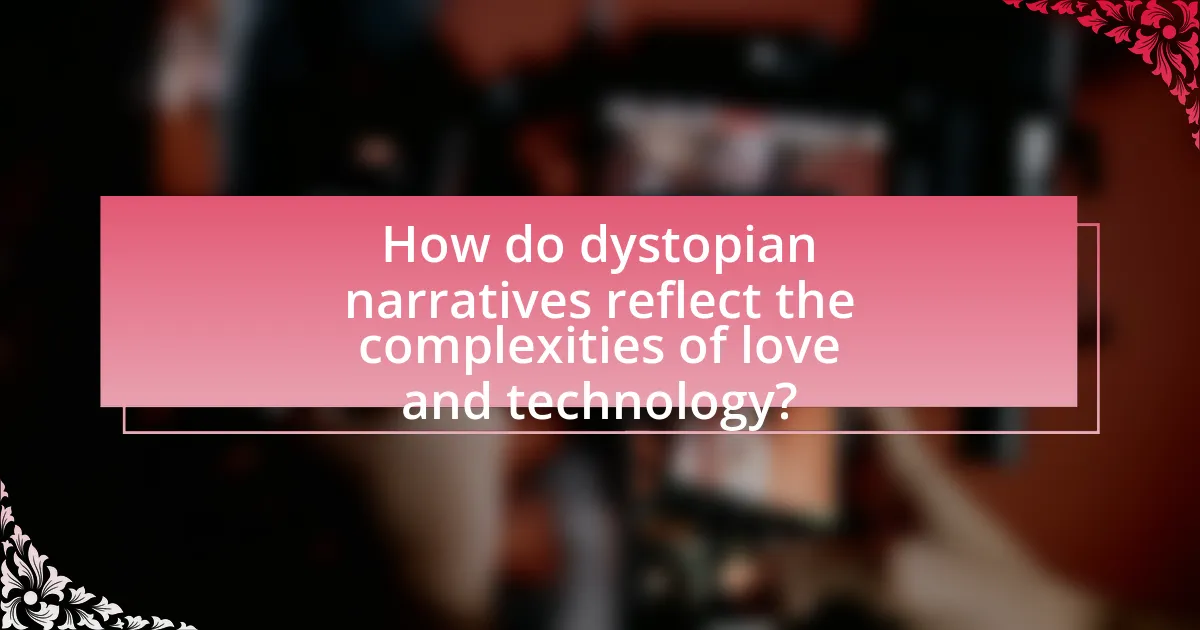
How do dystopian narratives reflect the complexities of love and technology?
Dystopian narratives reflect the complexities of love and technology by illustrating how technological advancements can both enhance and undermine human relationships. In these narratives, technology often serves as a tool for surveillance and control, which complicates the expression of love and intimacy. For example, in George Orwell’s “1984,” the omnipresent surveillance by the Party stifles genuine emotional connections, demonstrating how technology can create barriers to authentic love. Similarly, in “Black Mirror,” episodes like “San Junipero” explore the implications of digital immortality on romantic relationships, highlighting the tension between technological convenience and the authenticity of human emotions. These examples underscore the dual nature of technology in dystopian settings, where it can facilitate connections while simultaneously eroding trust and privacy, ultimately reflecting the intricate dynamics between love and technology in a controlled society.
What are some notable examples of dystopian literature and film that explore this theme?
Notable examples of dystopian literature and film that explore the theme of technology’s role in relationships include “1984” by George Orwell and the film “Her” directed by Spike Jonze. In “1984,” the oppressive surveillance state exemplifies how technology can manipulate personal relationships and suppress love through constant monitoring. Similarly, “Her” presents a future where artificial intelligence alters human connections, showcasing both the intimacy and isolation technology can create in romantic relationships. These works illustrate the complex dynamics between love and technology in dystopian settings, emphasizing the impact of surveillance on emotional bonds.
How do these narratives critique contemporary societal issues related to technology?
These narratives critique contemporary societal issues related to technology by highlighting the pervasive surveillance and loss of privacy in personal relationships. For instance, they often depict characters whose intimate connections are undermined by constant monitoring, illustrating how technology can distort trust and authenticity. A notable example is the portrayal of social media platforms that facilitate voyeurism, leading to jealousy and insecurity among partners. This reflects real-world concerns, as studies indicate that 70% of individuals report feeling anxious about their online presence affecting their relationships. By showcasing these dynamics, the narratives serve as a cautionary tale about the implications of technology on emotional intimacy and societal norms.
What lessons can be learned from these dystopian portrayals of love?
Dystopian portrayals of love teach that technology can distort human connections and manipulate emotions. These narratives often illustrate how surveillance and control undermine trust and intimacy, leading to relationships based on fear rather than genuine affection. For instance, in George Orwell’s “1984,” the Party’s constant monitoring erodes personal bonds, demonstrating that love can be weaponized in oppressive environments. Similarly, in “Black Mirror,” episodes like “Hang the DJ” reveal how algorithms can dictate romantic compatibility, suggesting that reliance on technology may strip away the authenticity of human relationships. These examples highlight the critical lesson that while technology can facilitate connections, it can also create barriers that inhibit true emotional engagement.
How can individuals navigate relationships in a technology-driven world?
Individuals can navigate relationships in a technology-driven world by establishing clear communication boundaries and prioritizing face-to-face interactions. Research indicates that excessive reliance on digital communication can lead to misunderstandings and emotional disconnection, as highlighted in a study by the Pew Research Center, which found that 45% of teens feel overwhelmed by the pressure to be constantly connected. By setting limits on technology use during personal interactions, individuals can foster deeper connections and enhance emotional intimacy. Additionally, being mindful of privacy settings and data sharing can help maintain trust and security in relationships, as the risks of surveillance and data breaches are prevalent in today’s digital landscape.
What strategies can couples employ to maintain intimacy in a surveillance-heavy environment?
Couples can maintain intimacy in a surveillance-heavy environment by prioritizing open communication and creating private spaces for connection. Open communication allows partners to express their feelings and concerns about surveillance, fostering trust and understanding. Creating private spaces, whether physical or digital, enables couples to share intimate moments without the fear of being monitored. Research indicates that emotional intimacy is strengthened through shared experiences and vulnerability, which can be cultivated in these private settings. For instance, studies show that couples who engage in regular, meaningful conversations report higher levels of relationship satisfaction, even in challenging circumstances.
How can awareness of technological impacts enhance relationship dynamics?
Awareness of technological impacts can enhance relationship dynamics by fostering open communication and trust between partners. When individuals recognize how technology influences their interactions, such as through social media or surveillance, they can address potential misunderstandings and set boundaries. Research indicates that couples who discuss their technology use report higher relationship satisfaction, as they are better equipped to navigate issues like jealousy or privacy concerns. For instance, a study published in the Journal of Social and Personal Relationships found that couples who engage in conversations about their online behaviors experience improved emotional intimacy and reduced conflict.



